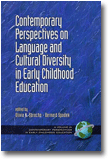
Contemporary Perspectives on Language and Cultural Diversity in Early Childhood Education
Edited by:
Olivia Saracho, University of Maryland
Bernard Spodek, University of Illinois
A volume in the series: Contemporary Perspectives in Early Childhood Education. Editor(s): Olivia Saracho, University of Maryland.
Published 2010
The purpose of the book series is to present reviews of current research in specific areas of early childhood education. Each volume is devoted to a particular area of the field. Within each volume scholars present reviews of research on particular aspects of the field of early childhood education. Each chapter summarizes the current research and provides an extended set of references which will facilitate readers in furthering their inquiries into research in that area. All contributions to each volume are juried, with an Editorial Board and additional scholars reviewing the draft chapters, suggesting ways that the chapters could be improved , and finally recommending them for publication. This process insures the quality of the contributions to the chapter and avoids the possibility of bias in the work.
Recent findings suggest that young children’s learning experiences are critical to their learning development, which has attracted the attention of researchers, scholars, and policy makers. Interest has focused on the early childhood policy and practice that can help improve the academic paths of children in poverty. Many of these children are from linguistically and culturally diverse families. The purpose of this volume is to review and summarize the current state of knowledge related to linguistically and culturally diverse children. It expanded cultural diversity to include social justice which can contribute knowledge in providing effective teacher preparation programs and high quality programs for linguistically and culturally diverse children.
CONTENTS
Linguistically and Culturally Diverse Children: Their Educational Dilemmas, Olivia N. Saracho and Bernard Spodek. PART I: ENGLISH LANGUAGE LEARNERS. The Politics of Language and Educational Practices: Promoting Truly Diverse Child Care Settings, Judith K. Bernhard and Veronica Pacini-Ketchabaw. Language Development and Early Education of Young Hispanic Children in the United States, Eugene E. García and Bryant Jensen. Language and Literacy Development in Latino Dual Language Learners: Promising Instructional Practices, Dina C. Castro, Ellen Peisner-Feinberg, Virginia Buysse and Cristina Gillanders. Young English Language Learners as Listeners: Theoretical Perspectives, Research Strands, and Implications for Instruction, Mary Renck Jalongo and Nan Li. PART II: LINGUISTICALLY AND CULTURALLY DIVERSE FAMILIES AND COMMUNITIES. The Interface of the American Family and Culture, Olivia N. Saracho. Culture as Framework versus Ingredient in Early Childhood Education: A Native Hawaiian Perspective, C. Kanoelani Nāone and Kathryn Au. Migrant and Refugee Children, Their Families, and Early Childhood Education, Susan Grieshaber and Melinda G. Miller. The Cultural and Symbolic “Begats” of Child Composing: Textual Play and Community Membership, Anne Haas Dyson. PART III: TEACHERS OF LINGUISTICALLY AND CULTURALLY DIVERSE CHILDREN. Teachers Telling Stories: Inviting Children Into Imaginative and Diverse Worlds, Celia Genishi, Cara Furman, Julianne P. Wurm, Molly Cain, Laura Osterman, Aya Takemura, and Wei-Yee Angela Tsang. Preparing Early Childhood Teachers to Enact Social Justice Pedagogies, Sharon Ryan and Nora Hyland. PART IV: CONCLUSION. Classroom Diversification: A Strategic Future Perspective for Equal Rights, Olivia N. Saracho and Bernard Spodek.
-
Paperback978-1-60752-416-8
Web price: $45.04 (Reg. 52.99)
-
Hardcover978-1-60752-417-5
Web price: $80.74 (Reg. 94.99)
- eBook9781607524182

-
 Contemporary Perspectives on Research in Assessment and Evaluation in Early Childhood Education
Contemporary Perspectives on Research in Assessment and Evaluation in Early Childhood Education
-
 Contemporary Perspectives on Research in Motivation in Early Childhood Education
Contemporary Perspectives on Research in Motivation in Early Childhood Education
-
 Contemporary Perspectives on Research on Bullying and Victimization in Early Childhood Education
Contemporary Perspectives on Research on Bullying and Victimization in Early Childhood Education
-
 Contemporary Perspectives on Research on Child Care in Early Childhood Education
Contemporary Perspectives on Research on Child Care in Early Childhood Education
-
 Contemporary Perspectives on Research on Child Development Laboratory Schools in Early Childhood Education
Contemporary Perspectives on Research on Child Development Laboratory Schools in Early Childhood Education
-
 Contemporary Perspectives on Research on Coronavirus Disease 2019 (COVID-19) in Early Childhood Education
Contemporary Perspectives on Research on Coronavirus Disease 2019 (COVID-19) in Early Childhood Education
-
 Contemporary Perspectives on Research on Immigration in Early Childhood Education
Contemporary Perspectives on Research on Immigration in Early Childhood Education

